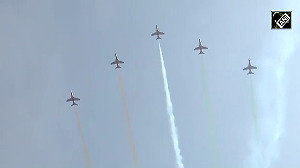Naresh Chandra was India's ambassador in Washington from 1996-2001, and had to tackle the immediate fallout of May 1998 Pokhran tests.
Today, among other things, he 'leads the Indian delegation to the India-US strategic dialogue twice a year.'
In an exclusive chat with rediff readers, an upbeat Ambassador Chandra, who believes that explains the significance of the nuclear deal which was signed by Prime Minister Manmohan Singh and US President George W Bush hours earlier in New Delhi.
Rejecting charges that India had compromised its strategtic interests, he says that 'serious business is being transacted without going in for any secret deals'.
The transcript:
spokesman asked, americans can be friendly, but americans never become friends!! they can never be friends!! This is the old saying..........so why India doesn't accept the fact.
Naresh Chandra answers: In my experience I have found many Americans very friendly to India as well as to me. It is too much to expect that they would agree with us all the time. We should trust each other more but remain alert and vigilant.
mchandra asked, Mr Chdnra, Rice stated that Pak and India are in same league.This took US 50 yrs to understand. But as soon as they land in Pak, they will start singing a different tone.
Naresh Chandra answers: Perhaps you meant that India and Pakistan are not in the same league. USA has accepted this but in certain areas and during certain periods they need to do business with Pakistan. This should not be seen as a zero sum game. At any rate, USA has made it clear that the civil nuclear deal with India is unique and will not be extended to Israel or Pakistan. This and other decision show that India is being taken as an emerging global power.
Sengupta asked, Mr Chandra, what guarantee do we have that the Americans will keep their end of the bargain after we put our reactors under IAEA safeguards? What happens if the US Congress rejects the deal?
Naresh Chandra answers:Prime Minister has already emphasized the reciprocal steps that each side has to take. India will be relived of its obligations in the unlikely event of US Congress not agreeing to the deal.
Gaurav asked, Hello Sir, I had not seen any strong opposition from BJP on Nuke deal....Does that mean left and others are opposing without any reason?
Naresh Chandra answers:Left is pursuing its old policies of opposing any agreement with the USA. They had never supported India's nuclear weapons programme in the past but are now over anxious to protect it from IAEA inspections etc. The government of India are ensuring that India's nuclear research capability is not diluted as a result of this agreement.
sz asked, Namaskar, Mr Chandra. It was a pleasure to see you in American TV when CNN had Anita Pratap as New Delhi correspondent. What is going on with Bush Visits. Is the Govt doing things that are known to the strategic community, or some unholy stuff going on ?
Naresh Chandra answers:You will be glad to know that serious business is being transacted without going in for any secret deals. Much progress has been made for developing India's capabilities in energy, agriculture, biotechonology and for boosting trade and investment. It promises to be a very productive visit.
nithijn asked, Mr. Chandra.. do you think India can take away the reactors off International safegurads, suppose US stop the suppply of fuels one day?
Naresh Chandra answers:I believe that the agreement is likely to ensure that supplies of fuel for our reactors would not be interrupted. Such an assurance is going to be a part of the deal.
karthik_rn79 asked, Mr Chandra: Do you think India can trust the USA? They have never played fair and always have their interests ahead of their commitments (read Tarapur). They believe they can get away with anything (read Iran/Iraq/Afghan/Mujahideen). Dont you think we are playing into their hands by signing the deal?
Naresh Chandra answers:If we proceed on this assumption, then we cannot have any deal with USA or another strong power. Each country puts its own national interest first and USA and India are no exceptions. What is important is the fact that USA and India have much common ground for cooperating in strategic and other areas.
sats asked, HI Sir, Do you think US can be believed when it has broken its earlier commitments on supplying nuclear fuels in 1960s? Does today's agreement require us open FBRs also under IAEA survillence? How can we forget that they bombed IRAQ,destroyed on pretext of having WMD and let said its a mistake!!!
Naresh Chandra answers: Much has changed since Tarapur. USA now realizes that strong India is good for peace and harmony in Asia. The Tarapur problem arose because of the passage of nuclear non proliferation act by USA congress in 1978. This is now going to be amended to enable supply of fuels to India. India is not Iraq and no country including the USA would ever think of launching military action against a country like India.
sreejit asked, What does this nuclear deal mean to US?
Naresh Chandra answers:It means that USA feels the need for reviewing the old, orthodox, non proliferation regime. USA recognizes the need for placing India in a special category so that both nations can cooperate in high technology areas. This will benefit the USA also.
JawaharNehru asked, Mr. Chandra, why does suddenly the nuclear deal hold so much importance to India, when all this time our Atomic Sciences establishment projected a picture of self reliance and indigenious advancements?
Naresh Chandra answers: Our scientists have done a great job in difficult circumstances. They can even do better if they have access to foreign sources of research and supply of equipment and technology. This will accelerate the growth of nuclear power industry and research productivity.
govinddotpantatrediffmaildotcom asked, i read ministry of foreign affiars inviting aamir khan and aishwarya rai to join Luncheon? for a person with rathional thinking, practically both of them doesn't fitthe bill!! Right mens at the wrong time. Do you think inviting them is logical? what purpose does it serves?
Naresh Chandra answers:It is customary on such occasions to invite successful personalities from various walks of life. Hollywood and Bollywood are both very popular institutions in our countries. I have seen many Hollywood film stars at White House dinners. In addition, their presence makes the party go well.
Naveen asked, Mr Chandra in the new world order America has started acknowledging India as a strategic partner. Then why they are hesitant in supporting us for permanent UNSC seat?
Naresh Chandra answers:Naveen I agree with you. Opinion in USA is growing in favour of India's inclusion as permanent member at the UNSC. There is some resistance because of India's voting record in the UN which was generally at variance with the US vote. India represents one sixth of man kind. It is a non militaristic democratic open society. Any reform of UNSC will have to take this into account.
affinor asked, Hello Sir... I am an Indian national studying in USA, Delware. Although I have been there 3 years, I still feel there is a lack of understanding when it comes to accepting other cultures in USA. Currently I am in Spain and I found it very welcoming compared to some of the indifferent experiences. Do you think with all the social and financial squeeze on international people working in USA it will continue to remain an attractive place in the future... I certainly have my doubts. It would be great if you could clarify the white house stand with regards to multiculturulism.
Naresh Chandra answers:Almost all leading personalities in USA support multiculturalism which is the backbone of American society. It is also true for India. However in some locations particularly small towns there is a resistance to settling down of foreigners or strangers. This happens in most countries, but relatively less in USA. The squeeze on labour is a temporary phase. US business and Industry would need people from outside for various positions in their establishments. This pang of globalization is being felt in most developed countries.
govinddotpantatrediffmaildotcom asked, you are a season beaurocrat and a high profile diplomat. tell us how junior bush is different from senior bush and can his visit be compared to NIXON to China?
Naresh Chandra answers:Bush SR.was a experienced professsional and had also served as head of CIA. Bush JR has come through the office of governor of Texas. He is less prone to conservative advise from bureaucrats. His key advisors are either old Bush SR associates like Vice President and Defense Secretary, or people he has hand picked like Condolezza Rice. This has enabled him to follow bold initiatives and review the non proliferation policy, something that Bush SR might not have attempted. While Bush's visit will result in a great advance in our relations. It is not the type of U turn in policy which occurred at the time of Nixon's visit to China.
Vien asked, Do you feel that the image of India in american minds has improved post 1998?
Naresh Chandra answers:In 1998 our relations were at a dip after the Pokharan tests. There has been a dramatic improvement since then.
krrish asked, What hidden interests (apart from International Security concerns) has US got with getting sign this controversial deal? Would appreciate your opinion.
Naresh Chandra answers:It is difficult to fathom hidden interests. In this case the mutual advantage is in enhancing cooperation have been spelt out by both sides. Actually, the deal is not all that controversial considering the democratic nature of our society where all differences of opinion are vigorously aired.
cybersubbu asked, Bush's visit is overshaddowed by the nuclear deal. What would be the opportunities of Indian products getting into the US market like that of China?
Naresh Chandra answers:Imrpoving trade and business is an important part of the discussions. I don't think the high focus on the nuclear deal would affect progress on trade issues. Indian exports to US are growing and this depends on their quality and competitiveness.
Ravi asked, While 'Corporate India' has done an amazing job of promoting India overseas and earning recognition as being among the 'best in the class', successive Governments are finding it difficult to make in-roads on issues that matter most to India on the diplomatic front : UN Security Council seat, catching-up on Chinese diplomatic dominance of Asia, befriending Nepal, Bangladesh and Sri-Lanka in a durable manner, etc., How (in your opinion) can we make our public institutions (lead by IAS & IFS officers) and politicians deliver on these fronts ?
Naresh Chandra answers:This is a serious but very long question. Corporate India and government officials are now working quite closely together. I myself lead Indian delegation to the India US strategic dialogue twice a year. Both sides have officials, industrialists, military officers, scientists, experts and politicians. The idea is to develop a common approach to developing an action plan for promoting cooperation in every important field. Diplomatic activity in consultation with friendly powers has been undertaken to ensure a proper reform agenda for the UN which also includes UNSC. US and India have common ground in ensuring a reasonable balance of power in Asia without China or any other country playing the hegemon.
sapangoyal asked, Hi, do u think we are going to sign the CTBT?
Naresh Chandra answers:The short answer is No. The US itself has not ratified this treaty. We have taken a unilateral decision by declaring a moratorium on further testing.
sameir asked, Mr. Naresh Chandra, thank you for a fantastic job of representing India. Today the Chinese were quick to issue a terse statement that we should abide by NPT. How strong is the Chinese lobby in the US Congress to sabotage the deal there?
Naresh Chandra answers:China as well as some other countries continue to urge India to sign the NPT. This is very curious considering that it is China which supplied nuclear weapons technology to Pakistan in violation of the NPT provisions. This time the Chinese statement refrains from urging India to 'sign' but only to abide. This subtlty should not be missed. I don't think China would take any serious steps to sabotage the passage of necessary legislation in US Congress.
Naresh Chandra says: EVERYONE: Thank you very much folks for your very generous response. I would have loved to chat with you some more but my time is up and I must defer this pleasure for a future date. Have a nice day.
The Bush visit: Complete coverage | Chats | The nuclear deal




